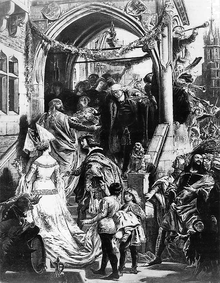- Congress of Kraków
-
The Congress of Kraków (Polish: Zjazd krakowski) was a meeting of monarchs initiated by King Casimir III the Great of Poland and held in Kraków (Cracow) around September 22-27, 1364. The pretext for calling the meeting was very likely a proposed anti-Turkish crusade, but the Congress was actually concerned mostly with European diplomacy issues, of which preeminent were peaceful relations and the balance of power in central Europe and negotiating a common response to the Turkish threat through the project of a central European league of states.[1]
The participants - guests of the Polish king were Charles IV, Holy Roman Emperor, King Louis I of Hungary, King Valdemar IV of Denmark, King Peter I of Cyprus, Siemowit III of Masovia, Bolko II of Świdnica, Władysław Opolczyk, Rudolf IV, Duke of Austria, Bogislaw V, Duke of Pomerania, Casimir IV, Duke of Pomerania, Otto V, Duke of Bavaria and Louis VI the Roman.[1]
The Congress, which took place in lavish surroundings, intended as a manifestation of the Polish king's power and wealth, echoed throughout Europe. It included a famous banquet at the house of the Kraków merchant Mikołaj Wierzynek, organized by the city council. The occasion for the feast, which according to Jan Długosz lasted for 21 days, was the recent wedding of Charles IV and Casimir's granddaughter Elizabeth of Pomerania.[1]
The several medieval sources available do not always agree on the timing and other issues. Possibly there were two separate congresses, one in 1363 that had to do with the marriage, and another in 1364, the more political congregation of the monarchs. In 1364 among the issues discussed were the Angevin succession to the Polish throne, and the ratification of the peace treaty involving Louis I and Charles IV among others, arbitrated by Casimir III and Bolko II.[2] An important source is a poem of Guillaume de Machaut who described the banquet in Wierzynek's house [3]
References
- ^ a b c Polish Wikipedia articles Zjazd krakowski and Wierzynek
- ^ Jerzy Wyrozumski - Dzieje Polski piastowskiej (History of Piast Poland), ISBN 83-85719-38-5, p. 372-372
- ^ Norman Davies, "God's playground", v.I, Oxford University Press 2005, p.81
Categories:- 1364 in Europe
- 14th century in Poland
- History of Poland (966–1385)
- History of Kraków
- 14th-century diplomatic conferences
- 1364 in international relations
- Polish history stubs
Wikimedia Foundation. 2010.

